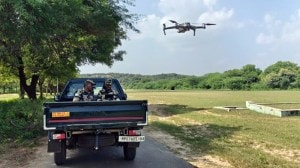Think ‘out of the box’ is PM’s line before Indo-Pak dialogue
Taking off from Prime Minister Manmohan Singh’s prescription of ‘‘thinking out of the box’’ with Pakistan, the Gove...

Taking off from Prime Minister Manmohan Singh’s prescription of ‘‘thinking out of the box’’ with Pakistan, the Government is readying a series of interesting proposals that includes visa-free travel across all three states adjoining Pakistan and perhaps a passport with special features for Kashmiris to travel across the LoC.
Pakistan Foreign Secretary Riaz Khokhar arrived here this evening for his day-long review meeting with his Indian counterpart Shyam Saran tomorrow, which will be followed by a two-day conversation between the two Foreign Ministers K. Natwar Singh and Khurshid Kasuri.
In New Delhi, the government, signalling a political united front on the issue, called an all-party meeting where Singh briefed the UPA as well as the Opposition, even as the Prime Minister met his predecessor A B Vajpayee, the architect of the peace process.
With significant institutional opposition to proposals like an internal ceasefire in Kashmir (the wordy ‘‘non-initiation of combat operations’’ that took effect at the start of Ramzan three years ago) and a rejection of the pre-1953 position when Kashmiris used a special identity card to travel across the Line of Control, the two-day meeting between Singh and Kasuri becomes crucial.
Manmohan Singh is believed to have told Vajpayee that he would like to ‘‘think out of the box’’ with Pakistan, and highly placed sources said the former PM encouraged the idea.
Whatever other political differences the two sides may have, the fact that the Congress and the BJP agree that the peace process should continue and compromises made, is being touted as a major achievement on the eve of the talks with Islamabad.
New Delhi will also push its proposed 72 confidence-building measures over the last composite dialogue round and is expected to make a few more. One idea looks at ‘‘religious travel,’’ but with a difference, for example a bus from Nankana Sahib in Pakistan to Ajmersharief in India.
Another believes that many more routes, both bus and train, can be opened across the IB and the LoC so as to sustain the Indian idea of a bridge that connects instead of divides the two countries.
Singh would, moreover, hardly like to have a lack of initiative on Pakistan cloud his first meeting with President Bush only a fortnight away in New York (they are meeting over breakfast on September 21), even if Bush remains busy with his own reelection.
The world would also look closely at a possible encounter between the Prime Minister and the Pakistani president in New York and the Singh-Kasuri meeting will set the ground rules for that one.
The US has constantly pushed India to improve conditions on the ground for Kashmir, while it has urged Pakistan to stop cross-border infiltration. It is accepted that the Srinagar-Muzaffarabad bus may well be the key that breaks the current deadlock.
One school of thought within the government still believes that India will not be giving away any strategic advantage if it agrees to cross-LoC travel on pre-1953-type identity cards. But this group also concedes it is heavily outvoted in favour of passports and visas for passengers, since ‘‘there can’t be one procedure for Kashmiris and another for Indians in the rest of the country.’’
Consequently, New Delhi could propose that visa-free travel be expanded to all three states adjoining Pakistan, that is Punjab, Rajasthan and Kashmir. Or, that passports remain, but with special features, which make clear that nothing in the proposal could be prejudicial to final solutions.
The hardline view is that the cross-LoC bus will make it easy for terrorists to sneak into India. The more realistic view is that a bus isn’t going to stop them.
Infiltration will be a major issue on New Delhi’s part, but there is also a strong perception that it may be possible to diversify the troop strength in the Valley, by diverting troops from civilian areas to the border.
Photos





- 01
- 02
- 03
- 04
- 05

























